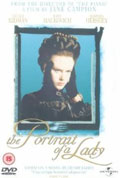
Directed by
Jane Campion
138 minutes
Rated PG
Reviewed by
Bernard Hemingway

The Portrait Of A Lady
Jane Campion opens her adaptation of Henry James’s 1881 novel with modern day young Australian women chatting about love and intimacy before cutting to Nicole Kidman in 19th century garb and the story proper. It is a gratuitous device to which the director does not return and rightly so as the main theme, female sense and sensibility, is well-represented without it.
Kidman plays Isabel Archer, an independent-minded young woman who has recently arrived in England from America and is staying at the home of her aunt (Shelly Winters) and uncle (John Gielgud). Although she is vigorously pressed to marry she wants to discover life and when her uncle dies and leaves her a fortune she has the financial means to do so. That is, until she is introduced to the dastardly Gilbert Osmond (John Malkovich) by a family acquaintance, Madame Merle (Barbara Hershey), whose sophisticated demeanour seduce her. She marries him but finds herself the dupe of a man who only wanted her money.
Photographed by Stuart Dryburgh who photographed Campion’s 1993 hit,The Piano, The Portrait Of A Lady is a splendid-looking, lavish production with the director at times making an almost film-schoolish use of visuals gimmicks to represent her themes, using gloomy interiors to suggest impending doom, backgrounds of bars to suggest imprisonment and fantasy sequences to represent Isabel’s sexually seething subconscious.
James’s novel is a long one that covers many years and perhaps for this reason the film struggles with balancing the need to relate the passing of events with showing how they developed. Most of the significant developments are signalled by cornerstone interactions, the characters having little to do with each other in between. Thus, Gilbert’s relationship with Isabel goes from seductive to indifferent with only the assistance of a title card announcing the passage of time. It is understandable as we already knew that this would be the outcome but still it feels overly blunt. If this relationship is the most schematically handled Isabel’s relationship with her cousin, Ralph Touchett (Martin Donovan) is the most effectively handled but in general there is probably too much surface and not enough depth, with the character of Madame Merle in particular insufficiently developed in order to keep a late plot twist as a surprise
Kidman, although not for my money having the qualities to excite such ardour from so many men, gives a fine performance, especially in the latter part of the film and Malkovich is at his Machiavellian best as a sadistically-controlling narcissist. Viggo Mortensen, Richard E. Grant, an unusually cast Shelley Duvall, and a very young-looking Christian Bale round out what is, at least in hindsight, a remarkable roster of acting talent.
Want something different?





